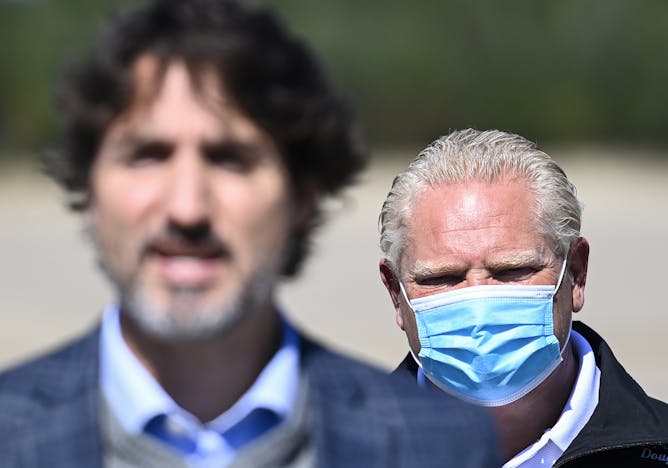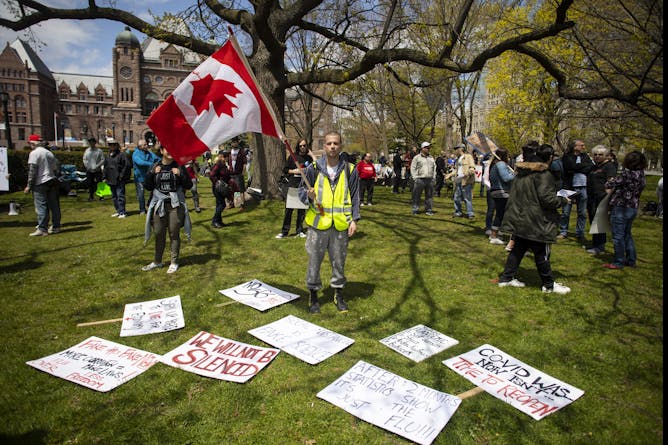|
It’s encouraging to see COVID-19 cases decreasing as more and more of the population gets vaccinated.
The disappointing news is that it’s unlikely we’ll reach full herd immunity — the kind where a virus like polio disappears from a population because so many people are immune that it can’t take hold.
The good news? We can achieve what Caroline Colijn and Paul Tupper of Simon Fraser University call “practical” herd immunity.
Today in The Conversation Canada, Colijn and Tupper explain why “full” herd immunity is probably out of reach. COVID-19 is likely here to stay, but we can reach a practical level of herd immunity that enables life to get back to something resembling normal.
And don't miss this must-read piece on how Canada has committed genocide against Indigenous Peoples by Fannie Lafontaine of Université Laval, who was the lead author of the legal analysis of genocide for the National Inquiry into Missing and Murdered Indigenous Women and Girls.
Also today:
All the best,
|

The level of immunity needed — either through vaccination or infection — for practical herd immunity is uncertain, but may be quite high.
(Shutterstock)
Caroline Colijn, Simon Fraser University; Paul Tupper, Simon Fraser University
It is unlikely that we will reach full herd immunity for COVID-19. However, we are likely to reach a practical kind of herd immunity through vaccination.
|

Handprints are seen on the side of a truck riding in a convoy of truckers and other vehicles in support of the Tk'emlups te Secwepemc people after the remains of 215 children were discovered buried near the former Kamloops Indian Residential School, in Kamloops, B.C..
THE CANADIAN PRESS/Darryl Dyck
Fannie Lafontaine, Université Laval
Ending the Canadian genocide of Indigenous peoples is a legal obligation, requiring honest, active decolonization. The lawyer who wrote the MMIWG's inquiry's legal analysis of genocide explains.
|

Arctic char dries in the sun in Gjoa Haven, Nunavut.
THE CANADIAN PRESS/Jason Franson
Mylène Ratelle, University of Waterloo; Joshua Garcia-Barrios, University of Waterloo
The Arctic and sub-Arctic regions are no longer exempt of industrial contamination. Researchers have found high blood levels of potentially harmful chemicals in people living in the North.
|

Prime Minister Justin Trudeau speaks as Ontario Premier Doug Ford listens at a groundbreaking event at a gold mine in 2020.
THE CANADIAN PRESS/Nathan Denette
Jeffrey B. Meyers, Thompson Rivers University
Ontario has historically been the province in Confederation most concerned about buoying Ottawa and limiting its own relative power for the sake of national unity. Doug Ford puts that legacy at risk.
|

Researchers say conspiracy theories around COVID-19 are spreading at an alarming rate across the country — and they warn that misinformation shared online may lead to devastating consequences.
THE CANADIAN PRESS/Chris Young
Jaigris Hodson, Royal Roads University
Gardening provides a helpful metaphor to help us understand how individual and platform approaches to misinformation need to be accompanied by policy and cultural reforms.
|

Instead of asking how universities might benefit from shifting courses online permanently, we ought to ask how students might suffer from fewer opportunities for lived experience and practice.
(Shutterstock)
Robert Danisch, University of Waterloo
We ought to worry that the pandemic has made it even easier to reduce teaching to disseminating knowledge.
|

(Shutterstock/VectorMine)
Zoë Pounder, University of Westminster
Les personnes atteintes d’aphantasie, lorsqu’on leur demande de former une image dans leur esprit, déclarent qu’elles ne « voient » rien.
|
Politics
|
-
George Ferns, Cardiff University; Marcus Gomes, Cardiff University
Rhetoric is hardening, but government policies still honour the special relationship with fossil fuels.
|
|
Environment + Energy
|
-
Vartul Sangal, Northumbria University, Newcastle
The bacteria which causes the infection in yellow-eyed penguins is closely related to a human pathogen.
|
|
Culture + Society
|
-
Simon Chadwick, EM Lyon; Paul Widdop, Leeds Beckett University
Much of the money that pays for the competition is spent to build global brands.
|
|